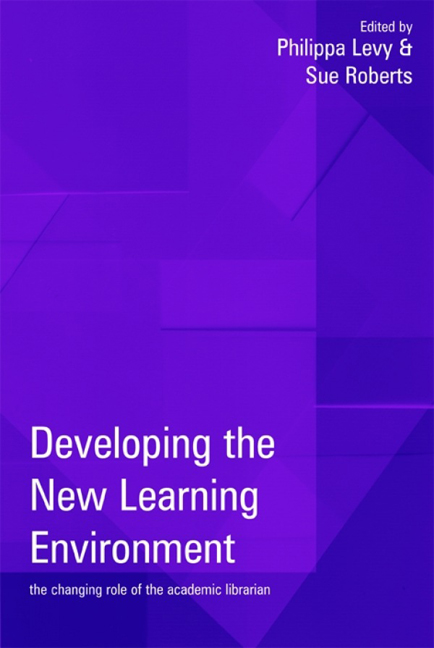Book contents
- Frontmatter
- Contents
- The editors and contributors
- Introduction: the challenge for the academic librarian
- Part 1 Perspectives on the policy framework
- Part 2 Policy into practice
- 6 New academic teams
- 7 Responding to the e-learning imperative
- 8 Information literacy education in practice
- 9 The inclusion agenda and its impact on practice
- 10 A kaleidoscope of change: how library management can support the development of new learning environments
- Part 3 Reflections
- Index
9 - The inclusion agenda and its impact on practice
from Part 2 - Policy into practice
Published online by Cambridge University Press: 08 June 2018
- Frontmatter
- Contents
- The editors and contributors
- Introduction: the challenge for the academic librarian
- Part 1 Perspectives on the policy framework
- Part 2 Policy into practice
- 6 New academic teams
- 7 Responding to the e-learning imperative
- 8 Information literacy education in practice
- 9 The inclusion agenda and its impact on practice
- 10 A kaleidoscope of change: how library management can support the development of new learning environments
- Part 3 Reflections
- Index
Summary
The authors of this chapter are members of the CLAUD consortium – librarians in HE networking to improve library access for disabled users in south and south-west England (www.bris.ac.uk/welcome/html). Changing legislation and UK government policy in the late 20th century has brought inclusion very much on to the HE agenda and made it a characteristic of the new learning environment. As the case studies and practical examples here illustrate, academic librarians are responding to and anticipating needs in creative ways. Inclusive strategies for library and information services and learning and teaching in general are fundamental to the future of HE, and therefore to the roles of its learner support professionals. This chapter once again portrays academic librarians working in partnership with other groups to develop an inclusive and responsive learning environment. It also depicts new roles, for example in relation to assistive technology, and points to new career paths in HE.
Introduction
The purpose of this chapter is to ref lect on the growing presence of disabled students in university libraries, and the impact this has had on our role as librarians. The major ways in which our roles have changed can be characterized as the increasing professionalization of personal initiatives, the embedding of ad hoc projects into mainstream practice and the fostering of cultural change. Before exploring examples from practice – the primary focus of this chapter – it is important to set such developments in the legislative context.
Legislative context
Since the late 1990s, the HE sector in the UK has seen the publication of what are considered the first major national benchmarks and milestones in relation to supporting students with disabilities, including those with specific learning difficulties (SpLD, e.g. dyslexia). The most significant and most recent of these is legislation in the form of the Disability Discrimination Act Part IV (1999), which includes the Special Educational Needs and Disability Act 2001 (SENDA). For an excellent overview of SENDA, and its implications for library and information services, see the SCONUL (Society of College, National and University Libraries) briefing paper, Access for Users with Disabilities (2003); this provides further information on issues such as physical accessibility and requirements.
- Type
- Chapter
- Information
- Developing the New Learning EnvironmentThe changing role of the academic librarian, pp. 181 - 199Publisher: FacetPrint publication year: 2005



